Malaysian Sustainable Farmer Chronicles: Women Smallholder Empowerment in Oil Palm
Breaking gender stereotypes in oil palm farming, independent smallholder Mariamah Yunus not only calls all the shots but is also empowered to give back to her community.
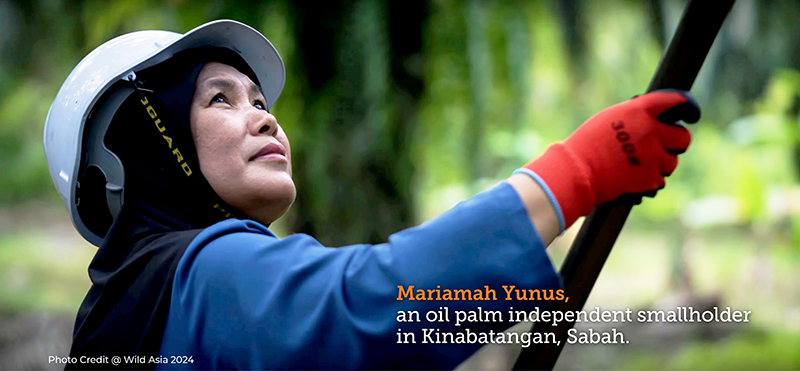
The 1980s marked the closing chapter of the logging industry in Sabah. Large tracts of lowland forests were converted into agricultural land or left to regenerate. Mariamah Yunus’s parents were among the pioneers to start an oil palm smallholding in the Kinabatangan District.
“In those days, if you cleared and developed vacant land, you could apply for land rights from the Jabatan Tanah (Lands and Surveys Department),” says the second-generation oil palm smallholder. Mariamah’s parents had moved their young family from Kampung Segaliud in Sandakan to seek greener pastures. Most settlers planted crops like rice and cocoa. Mariamah’s father went out on a limb and chose oil palm.
“He jumped into the deep end. With no (oil palm) planting knowledge or experience, he tried and failed the first three times,” recalls Mariamah, then a primary school student. The seedlings did not survive, or the trees did not fruit. Elephants and wild boars from a nearby forest reserve wandered onto the farm and wiped out the young trees. “We even lit fires at night to scare off the wildlife,” Mariamah adds. Fourth time lucky, they finally reaped their first harvest five years later. Her father’s ‘triumph’ convinced the other villagers, who were sceptical at first, to follow suit.
“My father never gave up. He was tenacious!”
Closing the Gender Gap
Mariamah narrated her family history as we lounged on the outdoor patio of her sizable house in Kampung Batu Puteh, Kinabatangan District. It did not take long for us to realise that the apple does not fall far from the tree. A dynamic female independent smallholder, Mariamah owns her land, manages her farm, and makes all the decisions, bucking gender stereotypes in a traditionally male-dominated industry. In the oil palm sector, women are typically seen as farm helpers who assist their husbands or male family members in running their smallholdings. They often lack resources like land, financing, training, and market access.
Mariamah’s farming journey began in the 1990s in Kampung Sentosa Jaya, Kinabatangan. A two-hour drive south of Sandakan, Sentosa Jaya is a settlement established in 1981. With a population of 422, three-quarters of the households here are involved in oil palm, either working for mills or estates or running their smallholding.
Fresh out of high school, Mariamah ran a mom-and-pop store on the banks of the Kinabatangan River. After she got married to her husband, a primary school teacher, they decided to plant oil palm to improve their livelihoods. Following her father’s footsteps, she cleared a vacant land and applied for land ownership in 1998.
“In the early years, it was all a communal effort—from land clearing and planting to harvesting, our families and neighbours helped out,” says Mariamah, who is of Bugis descent. By the time they reaped their first harvest, Mariamah’s husband had been posted to a school in another village. She was left to manage the farm and household alone with three young kids in tow.
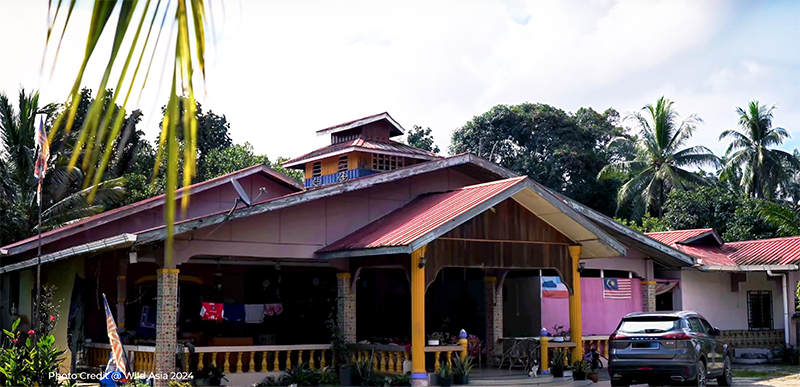
Mariamah resides in Kampung Batu Puteh and volunteers in many community programmes designed for socio-economic upliftment, where 43% of the population falls into hardcore poverty.
“He rarely came home, at most once a month, so I had to (and still) hold the fort,” says Mariamah, the 46-year old smallholder. “And being a woman, I feel like I have to go above and beyond to prove myself.”
Seven years after planting the first seeds, she earned enough income to hire contract workers to do the heavy lifting.
Steep Learning Curve
In 2018, Wild Asia extension agents arrived at Mariamah’s village to engage farmers to join the Wild Asia Group Scheme (WAGS). WAGS offers free technical advice and capacity building to help independent smallholder farmers meet national and international certification standards, as well as to improve their farm management practices.
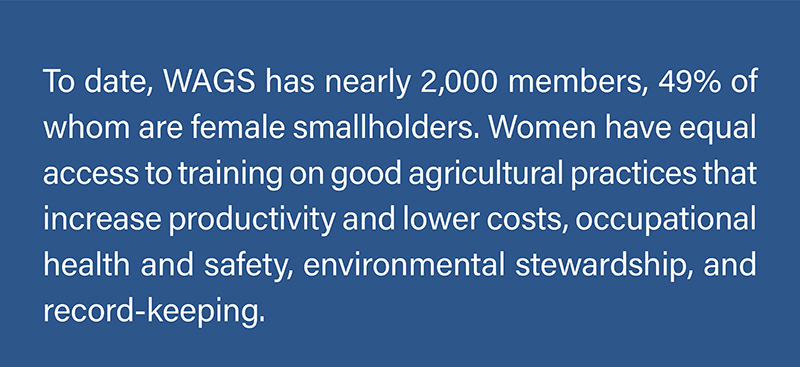
In 2014, she joined the Malaysian Palm Oil Board (MPOB)’s replanting programme and received support in the form of seedlings and fertilisers. However, enhancing training opportunities could further empower independent smallholders like her towards sustainable production.

Like farmers before her, Mariamah “blanket” (rampant) sprayed herbicide to manage weeds, planted seeds from loose palm fruits or inferior seedlings, and applied chemical fertiliser only when she had spare cash.
“I learned that rampant herbicide spraying degraded the soil and contaminated my farm’s pond (water source),” says Mariamah. Many of her seedlings either did not survive or produced low yields due to poor-quality seedlings and nutrient deficiency.
“I didn’t know the right kind of fertiliser to buy, how to apply them ebffectively, and how to stack the fronds ‘correctly’ to ensure the organic matter provides nutrients back to the soil,” she adds.
Through WAGS training, Mariamah switched to manually controlling weeds using a grass cutter and improved fertiliser use efficiency. She learned to log details like fresh fruit bunches (FFB) yields, costs of chemical inputs, farmhand wages, sales, and profits. WAGS staff also tracks her progress through the logbook.
“Before this, I never kept records of yields and production expenses,” says the mother of five. “Now I can manage my expenses. Whenever FFB prices drop, I know where to reduce expenditures” Mariamah also received a shelf to store chemicals safely on and personal protective equipment (PPE) like a safety helmet and gloves, courtesy of MPOB.
In 2019, her farm was certified by Malaysian Sustainable Palm Oil (MSPO). But the tangible shifts caught her off guard.
Since joining WAGS, her yields have nearly doubled, and her production costs have decreased by 40%. When palm oil prices skyrocketed during the COVID-19 pandemic (2021-2022), many smallholders like Mariamah received a windfall.
“Our oil palm income averaged RM12,000 to RM15,000 a month at the time,” says Mariamah, smiling. She channelled the profits into building a new house next to her home and rented it out for additional income. Today, her 6.07ha farm rakes in about RM6,000 monthly, with annual production averaging 100.67 metric tonnes.
“Most importantly, my soil and trees are healthy in the long haul, and my farm is better managed,” says Mariamah. A steady income also allows her to spend more on her children’s education, nutrition, and healthcare. Her perpetual challenge is finding contract workers to do the manual work labour such as harvesting and transporting FFB. When push comes to shove, like during the pandemic, she relies on relatives and neighbours to undertake ‘gotong-royong’ (communal work).
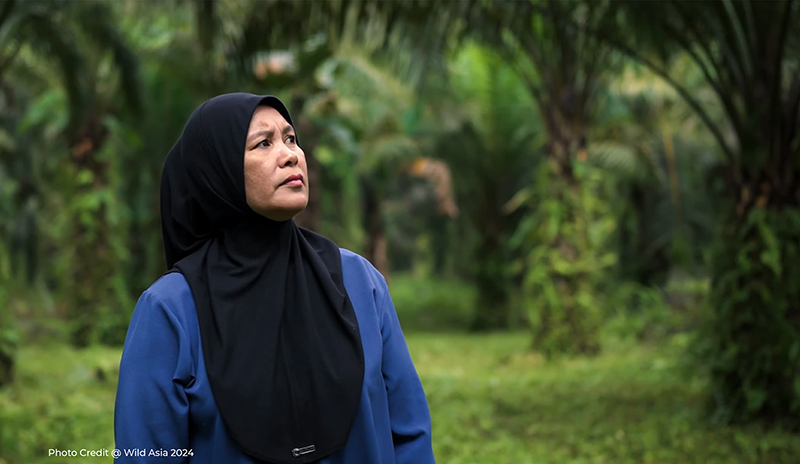
Through WAGS training, she learned the crucial steps to farming better: reducing the usage of chemical inputs and refraining from open burning.
Fostering Economic Resilience
Not one to rest on her laurels, Mariamah swears by the mantra – “sediakan payung sebelum hujan,” a Malay proverb meaning to prepare for any eventualities. To her, that means having other sources of income to weather the capricious palm oil prices. In her backyard, she plants Napier grass (Pennisetum purpureum), sugarcane, and bananas as fodder for livestock, and sells them at the nearby Borneo Elephant Sanctuary (BES).
The returns are modest, about RM700 a month. But Napier, for example, is easy to grow and manage and can be harvested weekly, she added. She also grows vegetables, herbs, and fruit trees for her family’s consumption. “I’m always looking for ways to make extra income, and I advise my female allies to do the same,” she quips. Two of her kids are still in school, while the three older kids are working adults. “My principle— be self-sufficient and independent!”
Although Mariamah is eligible to join Wild Asia’s WAGS BIO programme, which requires a commitment to chemical-free farming, she is still deciding whether to join.
“I’m not sure I can afford the time and energy just yet,” she admits with a smile.
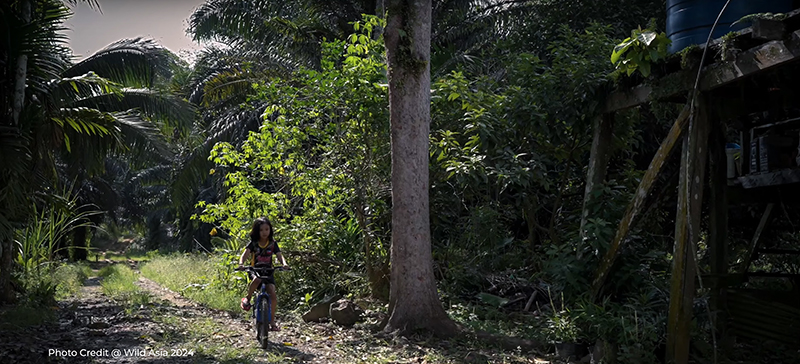
Always on the lookout to gain extra income by diversifying the plants, Mariamah empowers other women to be self-sufficient and independent.
Paying It Forward
As a woman who is always on a mission, being economically empowered means Mariamah can help those in need.
An ardent volunteer, she donates her time and money to organisations like the Muslimah Aali Yusuf, a grassroots social welfare organisation for Muslim women, KRT (Kawasan Rukun Tetangga - Neighbourhood Watch) and KOSPEN, a community-based health intervention programme.
Although Mariamah’s farm is in Sentosa Jaya, her family home is in Kampung Batu Puteh, 10 km south of Sentosa Jaya. 43% of the village’s population falls under the hardcore poverty (monthly household income below RM1,000) category, based on a 2018 study by the Sabah Forestry Department. Mariamah helps out in many community programmes designed for socio-economic upliftment.
She has been offered leadership posts in Muslimah and the JKKK (Village Development and Security Committees) thanks to her leadership traits, high energy, and dedication. But she turned down the offers because she has more than enough on her plate.
“Oil palm farming has provided us with a decent livelihood and quality of life,” says Mariamah, who welcomed her first grandchild in March. “I’m just blessed to be in a position to do my bit to help our community.
Discover the inspiring story of Mariamah in this short documentary and witness how sustainable oil palm planting has transformed her life.
In Malaysia, 5.65 million hectares of land have been cultivated with oil palm (MPOB 2023). Independent smallholder farms like Mariamah Yunus's (40.46ha of land or less) account for 14.5% (0.82Mha) of this planted area. As of 2023, there are 214,680 independent smallholders in Malaysia.
Article copyright @ Wild Asia 2024






